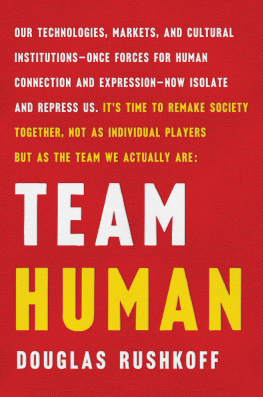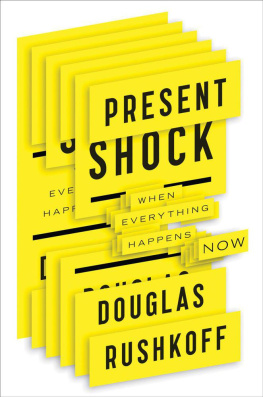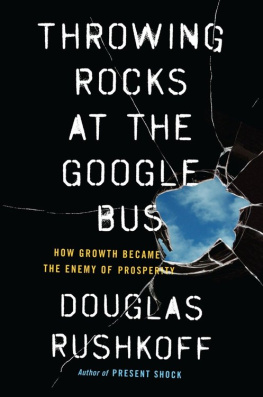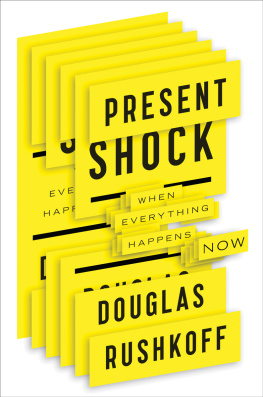I m supposed to start with something scary. You know, how the world is about to change very drastically and if you dont recognize this shift and reconfigure your business accordingly, doom awaits you. And after I paint that awful picture, Im supposed to earn your trust so that you follow me out of the box and into a whole new way of looking at your predicament.
Its a great formula for selling books, but it serves you no good purpose. For the world is not about to change so drastically. It already has. The change has comeyoure soaking in it. You dont need a trend forecaster to understand whats going on; you just need some eyes and ears.
After Ive frightened you, Im to tell you that theres a single path to salvation, and that I have it. Then I list a whole bunch of companies Ive consulted with that have done exactly what Ive said, to their great success (leaving out those that have failed using the same advice) and throw in a few case studies of other companies just to add some heft.
Butthanks, in part, to the change that has already happenedyou no longer need to model behaviors that worked for others, or even to analyze the processes through which they achieved success in order to repeat them. Thats a losing game, devised to disconnect you further from your own competence and make you even more dependent on the expertise of others. You shouldnt have to step outside your own intuition and experience to learn what worked for someone else in some other pursuit. Thats their story. You get to write your own. So, unlike most books aimed at businesspeople, this is not a series of lessons from the companies and organizations that got it right. For the landscape is littered with those who tried to follow the strategies that worked for someone else, what seemed like just yesterday. Younot someone elseare the expert in what you do.
To most businesses, this painfully obvious fact itself is a frightening prospect.
Just last year, I got a phone call from the CEO of a home electronics chain, asking if I could devise a new communications strategy for him. He had read one of my books on Internet culture and was wondering if I could help him make use of some of this below the line advertising hed been hearing so much about lately. He wanted his marketing to be less Saatchi and Saatchi and more craigslist. By this he meant he wanted to rely less on the expensive, high-concept traditional television advertising created by agencies like Saatchi&Saatchi, and somehow do his communications through bottom-up online communities, like the one that had developed around the craigslist online bulletin board.
As I reviewed the companys dossier, product line, and customer experience reviews, I realized this CEO had a much bigger problem than his ads. The chain had lost its way. It had alienated its core customer base by abandoning the electronics business and becoming more of an appliance store. It had pushed design and manufacturing offshore, leaving headquarters without talent who really understood electronics. As a result, the quality of store-brand products had deteriorated, leading customers to buy other brands at thinner margins. Finally, it had alienated its store managers through infantilizing incentives schemes, and their employees with oppressive loss prevention (antitheft) policies. Yet this CEO really thought a shift in marketing would change his whole business.
Thats when it hit me: What this fellow needed was not simply to hire companies like craigslist but to be more like craigslist.
American companies are obsessed with window dressing because theyre reluctant, no, afraid, to look at whatever it is they really do and evaluate it from the inside out. When things are down, CEOs look to consultants and marketers to rethink, rebrand, or repackage whatever it is they are selling, when they should be getting back on the factory floor, into the stores, or out to the research labs where their product is actually made, sold, or conceived. Instead of making their communications less Saatchi and more Craig, they should be reconnecting with their core enterprise.
Im hard-pressed to think of two companies that embody the difference between these two approaches better than the Saatchis and Craig. Consider the rise and fall of Saatchi&Saatchi for a moment. Its typical of the kind of company that chokes as soon as it has broken from the pack, losing its way and forgetting its core value proposition. Without competitors at their side, many companies dont even know what theyre about.
Sons of a prosperous Baghdad textile merchant, art patron Charles Saatchi and his brother Maurice, a Conservative party stalwart, founded Saatchi&Saatchi in 1970. The Saatchis took the conservative U.K. advertising world by storm with their provocative campaigns, a Rolodex full of high-society contacts, and a flair for self-promotion.
As the Financial Times put it, The Saatchi brothers expertise is in image-making. Their greatest triumph was in projecting the image of themselves and their company as the most dynamic force in worldwide advertising they were great magnets for young talentand made sure their company took full credit.1
Just a couple of clever ad campaigns led them to global prominence in the late 1970s. Their Labour Isnt Working spots for Margaret Thatcher became a new benchmark for political advertising. Their ad promoting the use of contraceptives featured a picture of a pregnant man. This edgy creative work, combined with the brothers talent for schmoozing clients and the powerful, gave them the ingredients to build an empire.2
But this was their tragic flaw: their quest for empire overshadowed their desire to make good advertising. In the process, they transformed themselves from an advertising agency into a holding company, and subsequently allowed their core competency to wither.
Making use of a loophole in U.K. investment law, the Saatchis raised hundreds of millions of pounds by going public, which they then used to acquire as many other agencies as they could gobble up. For a brief moment, they were the worlds largest advertising firm. But this didnt mean a lot. The Saatchis wanton acquisitions had stirred up a feeding frenzy and merger mania in the advertising business, from which the industry has yet to recover.
The new way to acquire clients was to snap up the agencies that already had bookings with them. Instead of focusing on making great ads and pitches, agencies either became obsessed with purchasing their peers or establishing high stock valuations to prevent hostile takeovers. Those agencies that are farsighted enough to grasp this will do well, Maurice Saatchi proudly told the Wall Street Journal.3
The cash-rich Saatchis set the standard for mismanaged capital and overindulgence. They had almost no interest in conventional management, making only halfhearted efforts at due diligence and, by all accounts, vastly overpaying for their acquisitions.4 The Saatchis thoroughly convinced themselves they could go beyond advertising and provide pretty much any service to their clients. Maurice Saatchi had a vision for the firm to become a one-stop shop selling advertising, management consulting and even financial services to corporate clients.5 This led to their disastrous attempt to acquire Midland Bank, a failing British clearing bank, in 1987. Saatchi&Saatchi stock price was 50 a share at the time, but the bidding price for Midland was up to 3 billion.
The brothers were rebutted by a skeptical banking community and chastised by their shareholders for their cavalier behavior. Their bidding campaign almost led the firm to bankruptcy.
Saatchi&Saatchis rampant expansion and indifference to costs eventually alienated clients and shareholders alike, driving the stock price down and leading to the brothers dismissal from their own agency. The remaining, restructured, firm was renamed Cordiant after merging with the U.S. company Bates Worldwide; then Saatchi&Saatchi was separated out again for its original name value alone, and purchased by the French conglomerate Publicis Group.





